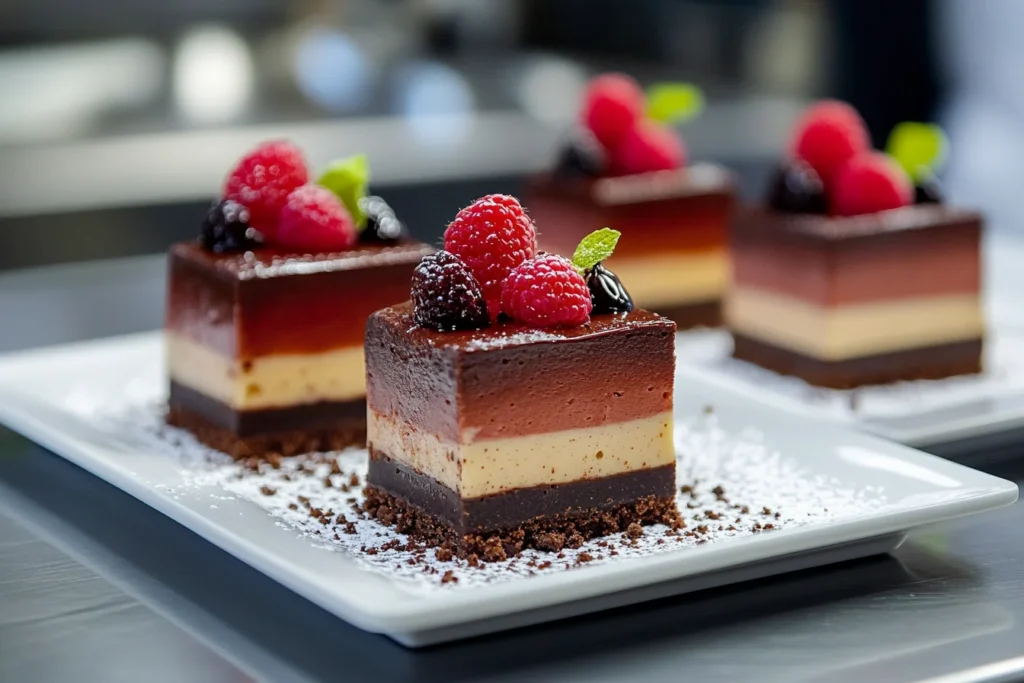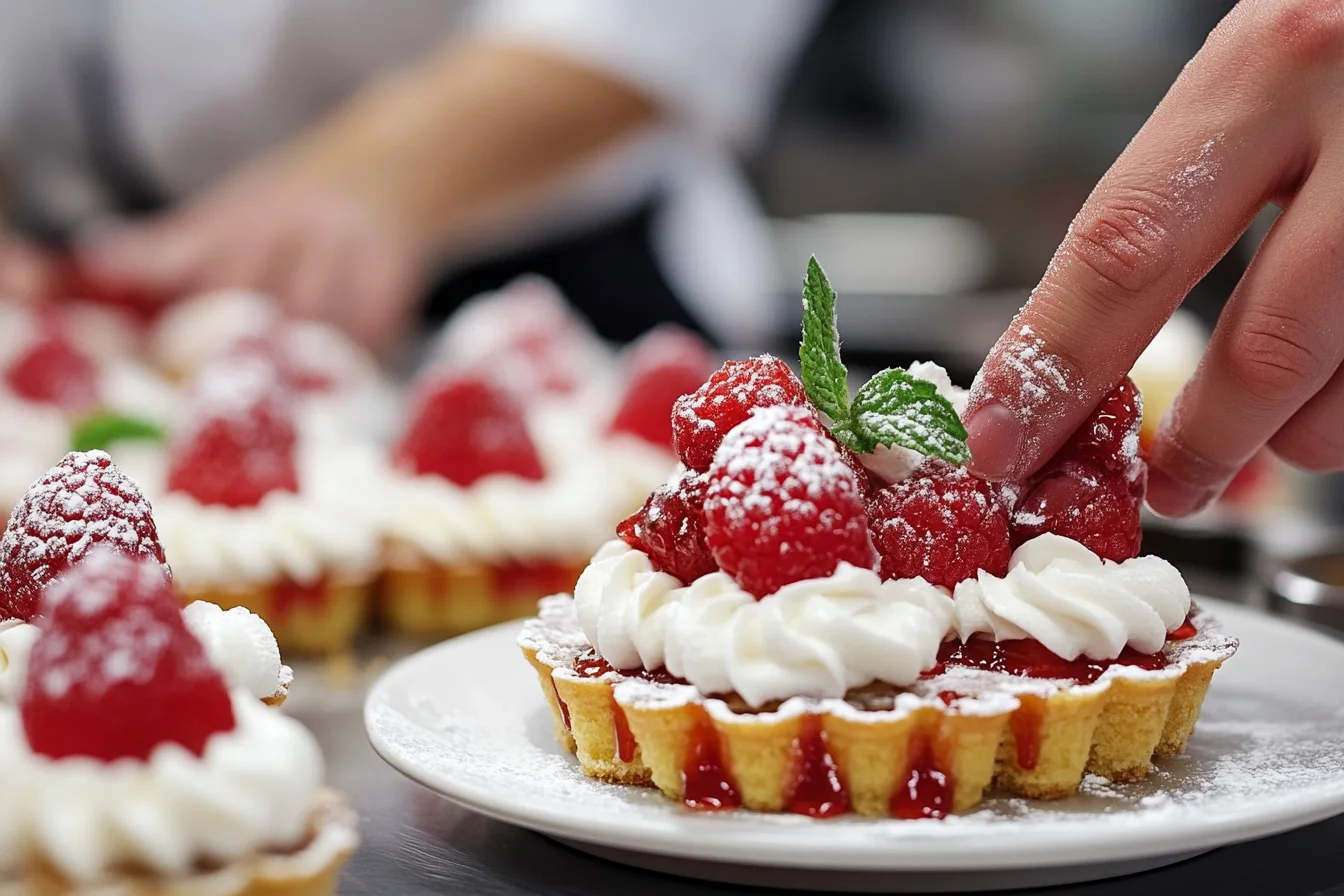What Questions Are Asked in a Pastry Chef Interview? When preparing for a job interview as a pastry chef, understanding the types of questions you might face can help you present yourself confidently. This article covers the most common questions asked in a pastry chef interview, providing insight into how to craft compelling responses that showcase your skills and experience. We’ll also provide tips on how to prepare and what employers are looking for, ensuring you stand out from the competition.
Table of Contents
Key Questions You May Encounter in a Pastry Chef Interview (What Questions Are Asked in a Pastry Chef Interview?

In a typical pastry chef interview, you will face a mix of technical, situational, and personality-based questions. Employers want to assess your technical abilities, creativity, experience, and how well you fit into the kitchen team. Here are some of the most frequent questions and how you can approach answering them:
1. What Inspired You to Become a Pastry Chef?
This question is often asked to get a sense of your passion for the field. Employers are looking for someone who is genuinely motivated by the art of baking and confectionery.
To answer effectively, explain what initially attracted you to pastries. Mention specific influences, such as childhood experiences, mentors, or particular moments that sparked your interest in pastry-making. It’s important to show enthusiasm and provide a personal touch to help you connect with the interviewer.
2. Can You Describe Your Experience Working in a Professional Kitchen?
Employers need to understand your experience level and how well you adapt to the demands of a professional kitchen. Highlight the variety of kitchens you have worked in, emphasizing any relevant experience that matches the requirements of the job.
Include details about your previous roles, the types of pastry you worked on, and how you managed your time. Consider sharing an example of a busy day where you successfully completed multiple tasks, showcasing your ability to work under pressure.
3. How Do You Handle Working Under Pressure?
Kitchens are fast-paced environments where pressure is a constant factor. Employers want to know if you can handle the stress and still deliver high-quality work. To demonstrate this, share an example from your past where you had to stay calm and efficient despite challenging circumstances.
Make sure to mention your methods for maintaining organization, time management, and keeping a cool head. You might discuss how you prioritize tasks or how you handle last-minute changes.
4. What Is Your Favorite Pastry to Make and Why?
This question reveals a lot about your interests, strengths, and creativity. The answer you provide should show your technical skill and understanding of different pastry techniques.
Choose a pastry that highlights a skill you are proud of, such as intricate decoration, technical execution, or a creative twist. Describe why you enjoy making it, perhaps pointing out its complexity or the artistic opportunities it offers. Employers appreciate when a candidate speaks passionately about their craft.
5. Can You Share an Example of a Difficult Situation at Work and How You Overcame It?
Employers want to gauge your problem-solving skills, adaptability, and resilience in the face of challenges. Be honest about the difficulties you have faced, but ensure you focus on how you effectively resolved the situation.
For example, you could talk about an instance when a key ingredient was unavailable and how you creatively adapted the recipe. Demonstrate a positive attitude and a focus on solutions, as this will highlight your resourcefulness and ability to remain flexible.
6. How Do You Approach Menu Development for Pastries?
Pastry chefs are often expected to contribute to menu development, and this question assesses your creativity and understanding of the business side of the kitchen. Explain your process for designing a dessert or pastry menu, including how you research trends, balance flavors, and consider seasonality.
Mention how you like to experiment with different flavor combinations or your approach to plating for visual appeal. This is also a good opportunity to mention your knowledge of customer preferences and adapting your ideas to match the restaurant’s style.
7. How Do You Ensure Consistency in Your Pastries?
Consistency is key to a successful kitchen. Employers need to know that you can produce the same high-quality product every time. Discuss your strategies for maintaining consistency, such as careful measuring, recipe documentation, and attention to detail.
You could also mention any tools or techniques you use to ensure each batch meets quality standards, emphasizing the importance of maintaining standards even when working under pressure.
8. How Do You Handle Feedback or Criticism?
The culinary industry relies heavily on feedback to maintain high standards, so employers need to know if you can take constructive criticism positively. Show that you are open to feedback and view it as an opportunity for growth.
You might provide an example of a time when you received feedback, how you adjusted your approach, and what you learned from the experience. This highlights not only your professionalism but also your willingness to improve.
9. What Are the Most Important Safety and Sanitation Practices in a Pastry Kitchen?
Food safety is non-negotiable in a professional kitchen, so it’s crucial to demonstrate your knowledge of best practices. Talk about the sanitation protocols you follow, such as maintaining proper food temperatures, avoiding cross-contamination, and cleaning workspaces regularly.
You can also emphasize the importance of proper storage and handling of ingredients, especially perishable items, to avoid any potential hazards. Showing that you prioritize safety and cleanliness will make a strong impression.
10. How Do You Stay Updated with Current Trends in Pastry Arts?
Employers want pastry chefs who stay informed about industry trends and bring fresh ideas to the kitchen. Share how you continue learning, whether it’s through reading industry publications, attending workshops, following renowned pastry chefs online, or experimenting with new techniques.
Mentioning specific trends, like a type of pastry that is currently popular, can further demonstrate your industry knowledge. Employers appreciate when a candidate is proactive in keeping their skills relevant and innovative.
Additional Questions You May Encounter
11. How Do You Manage Inventory and Minimize Waste?
Inventory management is a key responsibility for a pastry chef, as it directly impacts the kitchen’s profitability. Employers want to know if you are mindful of costs and efficient in managing ingredients.
Explain your approach to tracking inventory, placing orders, and using ingredients effectively to minimize waste. You could mention techniques like accurate portioning, creative use of leftover ingredients, and efficient storage practices to extend the shelf life of products.
12. How Do You Train and Mentor Junior Staff?
Pastry chefs often play a role in training and mentoring junior kitchen staff. Employers want to assess your leadership abilities and your willingness to share knowledge with others.
Provide examples of how you have trained new hires or helped colleagues improve their skills. Mention specific methods, such as hands-on demonstrations, providing constructive feedback, or encouraging team members to take on new responsibilities. Show that you enjoy helping others grow and that you contribute positively to the team dynamic.
13. Describe a Time When You Had to Make a Last-Minute Change to a Recipe or Menu Item
Last-minute changes are common in the culinary world, and employers want to see if you can adapt quickly and maintain quality. Share an example where you had to alter a recipe or substitute an ingredient due to unforeseen circumstances.
Describe the situation, how you approached the change, and the outcome. Highlight your creativity and problem-solving skills, and emphasize that the final product still met or exceeded expectations.
14. What Are Your Favorite Tools and Equipment in the Pastry Kitchen?
This question allows you to showcase your technical knowledge and familiarity with different tools and equipment used in pastry-making. Mention specific tools that are essential to your work, such as a stand mixer, piping bags, or a sugar thermometer.
Explain why these tools are important to you and how they contribute to producing high-quality pastries. Employers want to know that you are comfortable using a variety of tools and that you understand how they enhance efficiency and precision in the kitchen.
15. How Do You Ensure that Your Pastries Cater to Different Dietary Restrictions?
Catering to dietary restrictions is becoming increasingly important in the culinary industry. Employers want to know if you can adapt your recipes to meet the needs of customers with dietary restrictions, such as gluten-free, dairy-free, or vegan options.
Discuss your experience with creating alternative recipes and your knowledge of substitute ingredients. For example, you could mention how you use almond flour for gluten-free pastries or coconut cream as a dairy substitute. Showing that you are mindful of inclusivity and capable of adjusting your recipes will make you a valuable asset to any kitchen.
16. How Do You Manage Your Time During a Busy Service?
Time management is critical in a professional kitchen, especially during peak service hours. Employers want to understand how you stay organized and ensure all tasks are completed on time.
Share your strategies for managing multiple tasks, such as prioritizing based on urgency, preparing mise en place, and maintaining a clean workstation. You could also mention how you communicate with other team members to coordinate tasks effectively and avoid delays.
17. How Would You Handle a Customer Complaint About a Dessert?
Customer satisfaction is vital in the culinary industry, and employers want to see if you can handle complaints professionally. Explain how you would listen to the customer’s concerns, apologize sincerely, and take steps to address the issue.
Provide an example if possible, showing that you remain calm, courteous, and solution-oriented. Employers appreciate candidates who can turn a negative situation into a positive experience for the customer.
18. What Is Your Experience with Cost Control and Budgeting in the Pastry Department?
Cost control is an important aspect of running a successful kitchen. Employers want to know if you are mindful of budgeting and capable of managing costs without compromising quality.
Discuss your experience with tasks like portion control, reducing waste, and selecting cost-effective ingredients. You could also mention any systems you use to track costs and ensure the pastry department remains within budget. Showing that you are financially savvy adds value to your role as a pastry chef.
19. How Do You Ensure High Standards of Presentation for Your Pastries?
Presentation is crucial for pastries, as visual appeal often influences customer satisfaction. Employers want to know if you pay attention to the details of plating and decoration.
Describe your approach to plating, including how you balance colors, textures, and garnishes to create visually appealing desserts. You could also mention any techniques you use to ensure consistency in presentation across multiple servings.
20. How Do You Work with Other Departments in the Kitchen?
Pastry chefs often need to collaborate with other departments, such as the main kitchen or front-of-house staff. Employers want to assess your teamwork skills and ability to communicate effectively.
Share examples of how you have worked with other departments to ensure smooth service, such as coordinating with chefs on menu pairings or communicating with servers about special dessert offerings. Emphasize your willingness to be a team player and your ability to adapt to the needs of the kitchen as a whole.
Tips for Acing Your Pastry Chef Interview

In addition to preparing answers for common questions, there are several other ways you can make a positive impression during your interview:
- Dress Professionally: Even though you may be interviewing for a kitchen position, it’s important to dress appropriately. Business casual attire is usually a safe choice.
- Be Punctual: Arrive on time or a few minutes early to demonstrate your reliability and respect for the interviewer’s schedule.
- Bring a Sample: If possible, bring a small sample of your work, such as a box of cookies or a few pastries. This gives the employer a chance to taste your creations and see your skills firsthand.
- Ask Questions: Prepare a few questions to ask the interviewer about the kitchen, the team, or the expectations for the role. This shows that you are genuinely interested in the position and eager to learn more.
- Show Your Personality: Employers want to hire someone who will be a positive addition to the team. Don’t be afraid to let your passion for pastry-making shine through during the interview.
Frequently Asked Questions
How to Be a Dessert Chef?
To become a dessert chef, you need a combination of formal education, practical experience, and creativity. Many aspiring dessert chefs start by attending culinary school, specializing in pastry arts. After that, gaining hands-on experience in professional kitchens is essential. You should learn from experienced pastry chefs, understand kitchen dynamics, and refine your technical skills over time.
Networking within the culinary community can also help you advance your career. Building relationships with other professionals may open doors to job opportunities and allow you to learn from industry experts. Additionally, practicing your skills at home and experimenting with new recipes will help you grow as a dessert chef.
What Is the Job of a Dessert Chef?
A dessert chef, or pastry chef, is responsible for preparing desserts, baked goods, and pastries for a restaurant or bakery. This role involves everything from designing new dessert menus to baking, decorating, and ensuring the quality of each dish. Dessert chefs must be creative, precise, and able to work efficiently under pressure.
In addition to preparing desserts, pastry chefs often manage inventory, order ingredients, and ensure that their kitchen area meets health and safety standards. They may also be involved in training junior staff and collaborating with other chefs to create cohesive menu offerings.
What’s the Dessert Chef Called?
A dessert chef is commonly known as a pastry chef. In French, this role is called a “pâtissier.” Pastry chefs specialize in creating baked goods and desserts, including cakes, tarts, bread, and confections.
Suggested Articles Links:


1 thought on “What Questions Are Asked in a Pastry Chef Interview?”